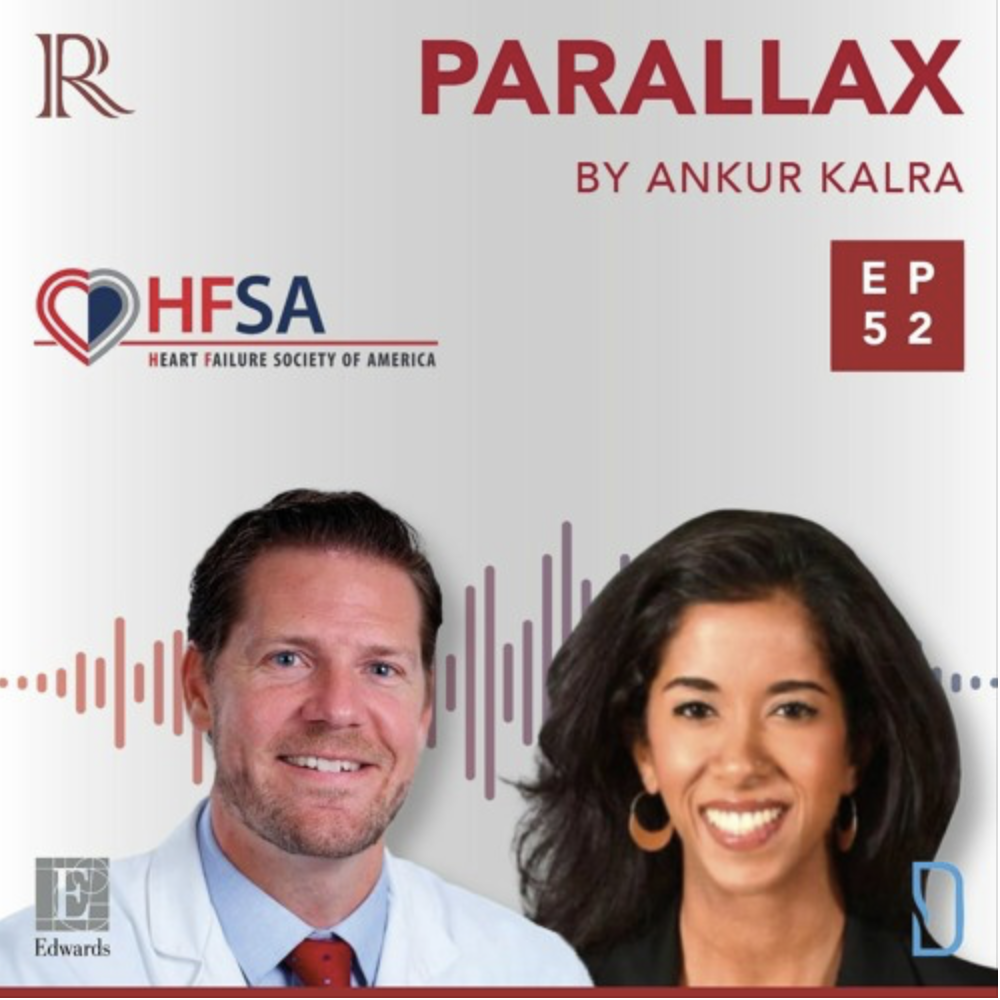
How can we change the language of medicine to set up patients for success? This was one of the questions of Dr Lala when she met a young father with acute heart failure. After talking with him, she replaced the word failure with function. This seemingly small change created a real difference for the patient. How can we create real understanding through words? How can scientific publishing aid diversity, equity and inclusion?
This week’s episode starts a series in collaboration with the Heart Failure Society of America (HFSA). Host, Ankur Kalra’s guests are Robert Mentz and Anuradha Lala Senior Editorial Team of the Journal of Cardiac Failure (JCF), the official journal of the HFSA and the Japanese Heart Failure Society (JHFS).
In this practical and insightful episode, Dr Kalra asks what does diversity, equity, inclusion and belonging mean to the editorial board of JCF and what were the steps taken to put these principles into practice. Dr Mentz and Dr Lala walk us through how they examined existing practices and turned ideas and core values into action, including transparency and diversity, while creating an atmosphere that is open to innovation.
How can we mandate diverse authorship? What prompted JCF to introduce an early career section? How can we stand by what we are putting forth?
Questions and comments can be sent to “podcast@radcliffe-group.com” and may be answered by Ankur in the next episode. Guests @robmentz & @dranulala, hosted by @AnkurKalraMD. Produced by @RadcliffeCARDIO.
The views expressed in this episode do not reflect the views of the Heart Failure Society of America or the Journal of Cardiac Failure and all views expressed herein are those of the guests appearing on the show.

Brought to you by Edwards: www.edwardstavr.com
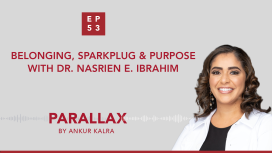
In this candid episode of Parallax, Nasrien and Ankur open up about their experiences of being an immigrant. Ankur asks Nasrien about her journey to medicine. Nasrien shares the lessons she took away from her years under the mentorship of Dr JoAnn Lindenfeld and later, Dr. James Januzzi. Finally, Nasrien shares her recent experience of writing Sparkplug and how she embraced life with its imperfections and found her purpose.

The charity organisation, Women as One is an agent for women and men to be part of medicine that is built on talent, rather than a privilege. Roxana and Ankur discuss the role of mentorship and family-friendly work environment in mending the broken house of cardiology. Roxana talks about the practical tools that are available for women to take the next steps in their career and achieve their goals.

Dr Kalra asks Dr Mauri about early influences and her traineeship with legendary interventionalists, the late Donald Baim and Richard Kuntz. Dr Mauri talks openly about her decision-making process and the importance of selecting your priorities and committing to them. Ankur asks Laura about her decision to go into industry. Laura shares her thoughts on medical innovations and meeting urgent needs with unique perspectives.
What is Dr Mauri’s advice for a young cardiologist? How did she balance research and patient care? What are the questions that helped her decision making? How does Dr Mauri think about innovations in medicine?

Brigham and Women’s Hospital’s Health Equity Committee decided to confront the status quo by asking: How is racism on a structural level present within our walls?
Ankur Kalra’s guests Michelle Morse (Founding Co-Director of EqualHealth and Assistant Professor at Harvard Medical School) and Lauren Eberly (Cardiology Fellow at the University of Pennsylvania) are co-authors of a retrospective study that demonstrated what had previously only been observed: That black or brown heart failure patients ended up in general medicine rather than specialised cardiology services. Following the publication of the study in November 2019, the Health Equity Committee started to roll out anti-racism trainings and to work on objective admission guidelines to mitigate biased behaviours.
Aarti Bhatt (Assistant Professor of Medicine at the University of Minnesota), member of the Minnesota chapter of Campaign Against Racism, talks about their initiative to support projects that have a positive impact on local communities on a global scale.

In this week’s Parallax, Dr Kanaa’N, the director of the program, and Dr Lahorra, chairman of the Heart, Vascular & Thoracic Department of Akron General introduce the listeners to the foundations of their program and the paradigm shift brought by TAVR.

Ankur Kalra asks Grant W Reed, Director of the Cleveland Clinic’s STEMI program, to reflect on the actions they took and the challenges of delaying cardiovascular procedures in the wake of the coronavirus pandemic. Dr Reed offers insight on the factors that influenced the Cleveland Clinic’s STEMI policy for COVID-19. Ankur and Grant discuss the triage considerations for patients with structural heart disease and the steps the clinic took to protect its healthcare workers.
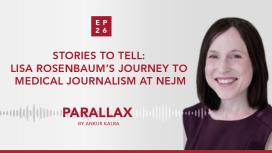
In this edition of Parallax Dr Kalra asked Dr Rosenbaum about the influences that shaped her choices as a writer and as a healthcare professional. Dr Rosenbaum opens up about her childhood and how she connected to her grandfather through writing and medicine. We learn about Lisa’s first day at medical school and her latest writing project.
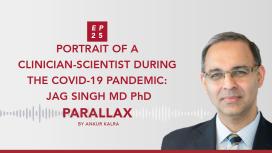
Jagmeet P Singh, associate chief of the cardiology division at Massachusetts General Hospital and professor of medicine at Harvard Medical School joins Ankur Kalra for a deep conversation about his journey across three continents. Dr Singh talks about the importance of choosing fulfilment over success. We gain more insights on the recent late-breaking trial, MADIT-CHIC focusing on cardiac resynchronization therapy. Ankur asks Jag about his experience of being on the other side of the healthcare system and his enrolment in the since halted remdesivir trial.
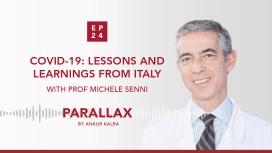
Prof Michele Senni is Director of Cardiology at Papa Giovanni XXIII Hospital, Bergamo Italy. He contracted COVID-19 himself and in this latest podcast he meets with Ankur Kalra, MD to discuss his personal experience in dealing with patients and COVID-19 in Europe’s outbreak epicentre.
Hear them discuss the burden on healthcare, patient selection, the importance of testing and PPE and how COVID has resulted in a reduction of acute myocardial infarction and heart failure in patients.
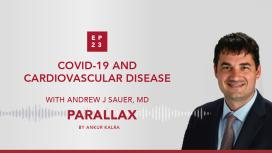
In this latest episode, Ankur Kalra, MD meets with Andrew Sauer, MD, co-author of an upcoming paper in US Cardiology Review on COVID-19 and Cardiovascular Disease that provides a concise and current summary of cardiovascular complications from COVID-19.
Hear them discuss the latest issues surrounding the pandemic, the known cardiac implications and the rapidly emerging data.
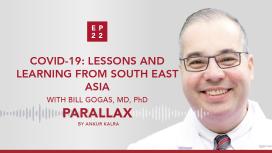
Hear Bill’s take on how East Asia responded to and successfully managed the pandemic and how they are now seeing a significant reduction in cases outside the epicentre. Hear how the strategy resulted in only 93 patients in Bill’s city of Nanjing, testing positive for coronavirus with a city population of 8 million.
Learn about effective responses, the importance of early control and how as a cardiovascular physician, your life and practice may be impacted by the virus.
Submit your question to Ankur via: podcast@radciffe-group.com.
Hosted by @AnkurKalraMD. Produced by @RadcliffeCARDIO.






